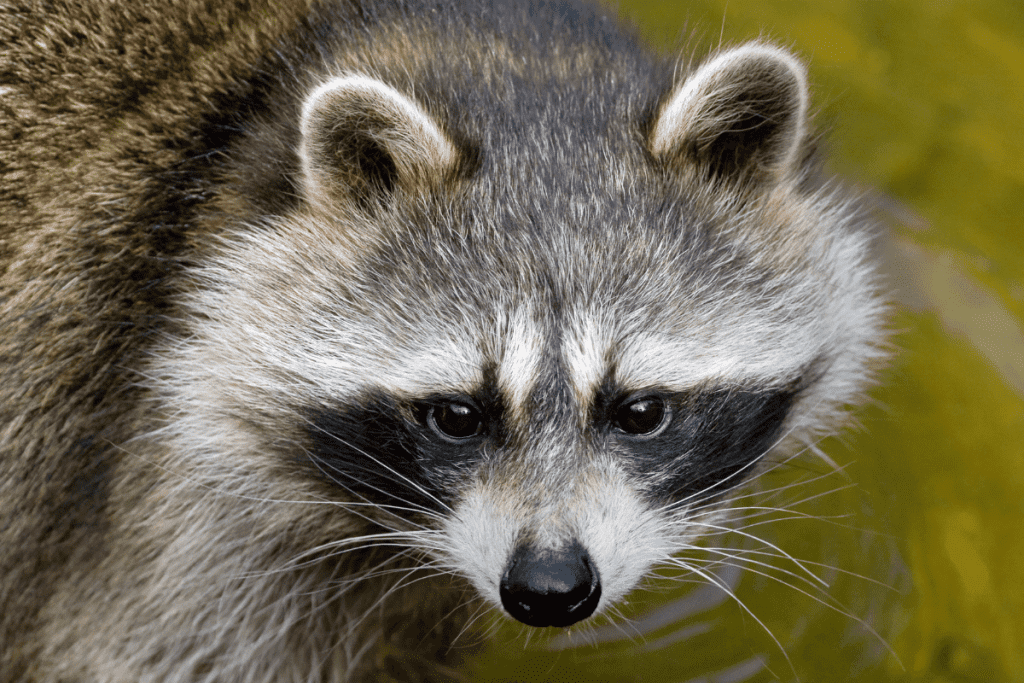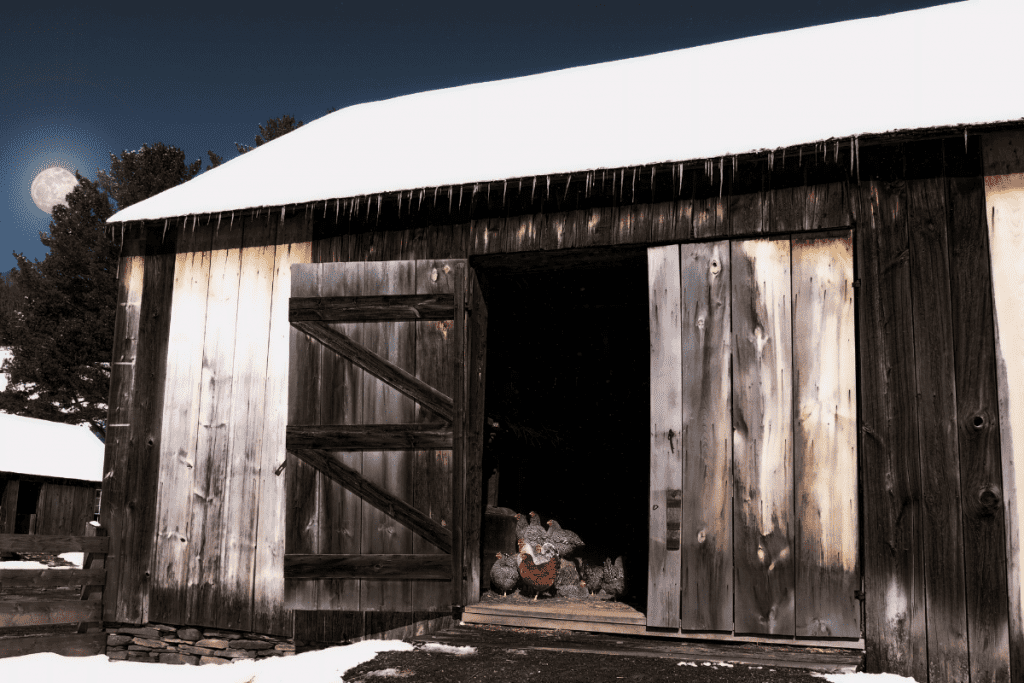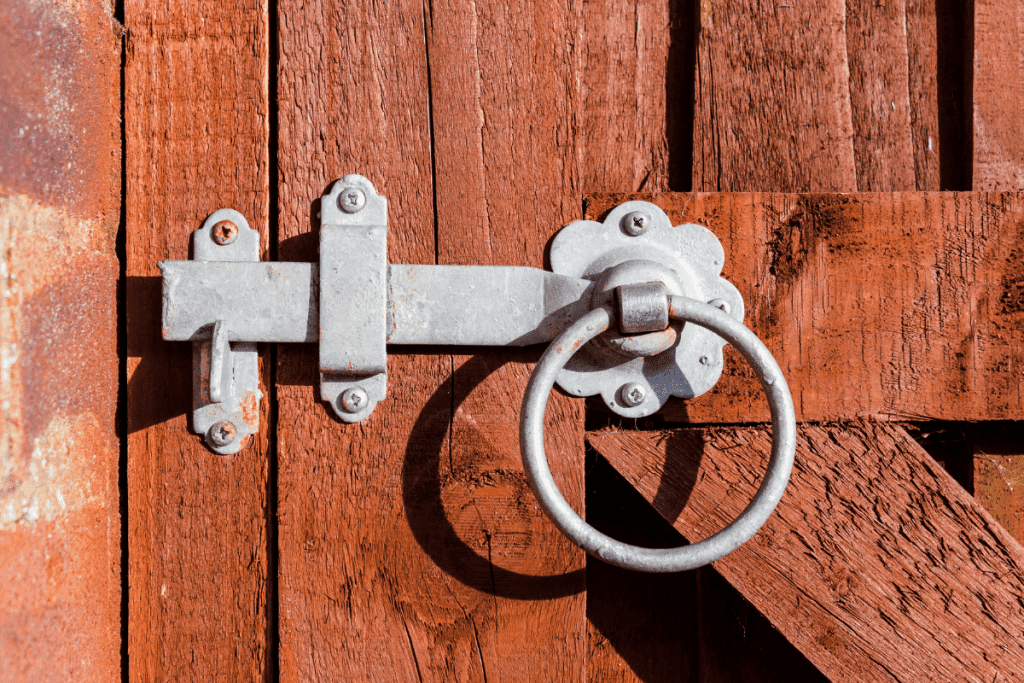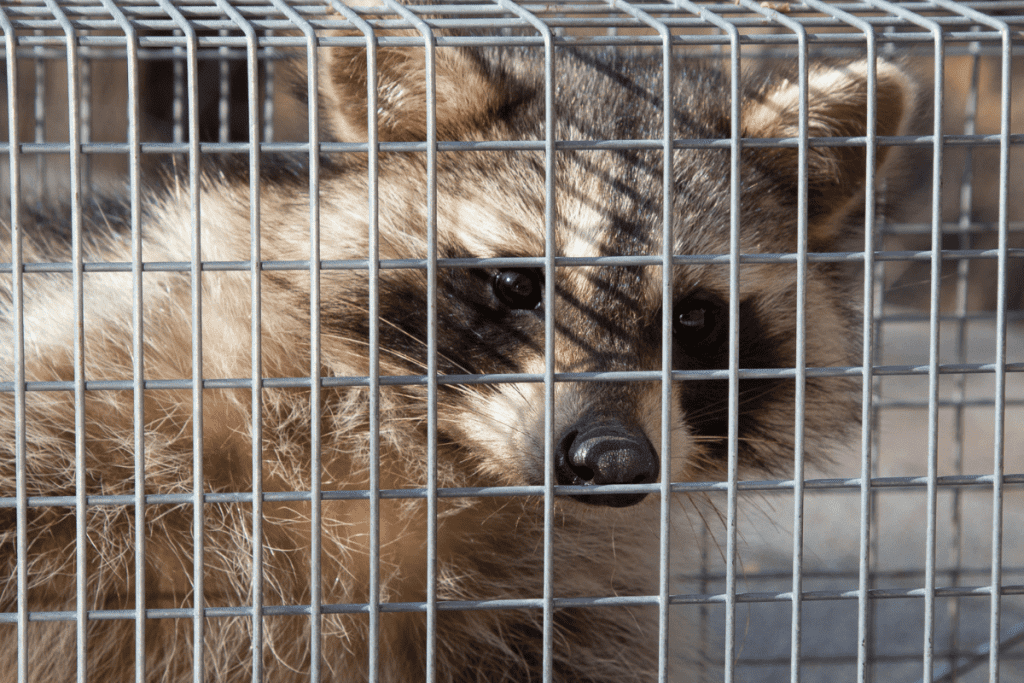Raccoons are, in many ways, very cute animals.
They are furry, have little hands, and their markings often make them look like little bandits.
Regardless of how cute they may seem, raccoons are often a menace to backyard chickens.
They are crafty and resourceful animals determined to get what they want, and raccoons love to eat chickens and their eggs.
If you’ve had the unfortunate experience of discovering your flock mauled by a raccoon, you’re more than likely looking for ways to protect your birds and keep the pesky raccoons from acting again.
Most successful ways of keeping your chickens safe from raccoons come from prevention.
We’ll educate you on 12 ways to stop raccoons from eating your chickens.

Table of Contents
ToggleCollect Eggs Regularly
One of the best ways to stop raccoons from eating your chickens is to keep them from getting tempted in the first place.
Once a raccoon sets something in its sights, it will do just about anything to get it.
The allure of chicken eggs is often one of the most common reasons raccoons get attracted to a coop in the first place.
Make it a part of your daily routine to check for eggs every single day.
If you allow a lot of eggs to collect in the coop, it will attract raccoons as well as a host of other predators.
We want to keep our backyard flock as safe and healthy as possible.
Collecting eggs regularly is a great way to keep raccoons away.
Fortify Your Coop With Hardware Cloth
Many people use chicken wire for their coop. In some instances, this is enough to keep their entire flock safe.
However, if you have tenacious and determined raccoons in your midst, chicken wire is not going to be enough to keep the predators out.
Raccoons have five fingers and are quite strong for their size.
These little predators are known to break holes in chicken wire easily.
This gives them direct access to your entire flock and their eggs.
Use hardware cloth or strong chain link for your coop.
It is much stronger than standard chicken wire and will keep raccoons from ripping holes to get to your chickens.
Hardware cloth like this galvanized wire mesh has smaller openings than standard chicken wire.
This will also help to keep your chickens safe.
Raccoons are truly barbaric when they kill.
Often they reach their arms through the holes in chicken wire and chain link and attempt to pull the chicken through the small opening.
Often this leaves a mangled chicken corpse and feathers everywhere.
We don’t want this for our chickens, so it’s best to keep the coop safe with adequate materials.
Cover The Roof Of The Coop
Raccoons are skilled predators.
They are strong and excellent climbers.
The natural habitat for raccoons in the wild is up in the trees.
You’ll see them scurry up the nearest tree if they feel threatened.
Because of this, there is no stopping a raccoon from scaling the sides of your coop and entering from above.
Some people address this problem by adding barbed wire to the tops of the coop walls.
While this is an excellent option for keeping raccoons out, other aerial predators still have access.
If you are taking the time to fortify your coop against raccoons, it’s best to do it right, so it keeps other predators out as well.
If you cover the roof of the coop, you’ll keep both ground and aerial predators from getting to your chickens.
Use the same hardware cloth or chain link to cover the top of the coop.
This way, predators like raccoons won’t rip holes in it.
Keep Your Chickens On A Schedule

Raccoons are primarily nocturnal creatures.
This means most of their hunting is done at dawn and dusk.
One way to prevent raccoons from hunting and eating your backyard chickens is by making sure your chickens are safe and locked up in their coop during prime hunting hours.
Knowing the eating schedules of local predators in your region will help you adjust your schedule to keep your backyard birds safe.
Make a habit of not letting your chickens out until mid-morning or a few hours after the sun has come up.
By this time, most nocturnal predators are back in their dens.
They won’t have access to your chickens during this time.
Similarly, you’ll want to have your chickens locked up in the coop at least an hour or so before sunset.
This is even more important than the morning routine.
Most raccoons hunt at dusk, and this is when they will attempt to eat your chickens.
It’s important to note how hunting habits change based on the season.
Raccoons will hunt more in the colder months, so keep an extra close eye during this season.
Make Sure Your Food Storage Is Sufficient
As discussed, preventing raccoons is significantly easier than stopping them once they know there is a tasty chicken treat waiting for them.
One way of keeping raccoons from being drawn to your chicken coop is by sufficiently storing your chicken feed.
Raccoons have an excellent sense of smell and may be drawn to your chickens by the smell of their feed.
Make sure your chicken feed is securely stored in a container.
Using a steel trash can with a locking lid is a great way to keep raccoons out.
A bungee cord will also further fortify your food storage and make it next to impossible for raccoons to get to.
Alternatively, consider purchasing a raccoon-proof storage container like this to keep raccoons away from your chicken feed.
These containers have an interlocking lid to keep out raccoons and rodents like squirrels, rats, and mice.
It also helps to keep the feed fresher for longer.
Bury The Hardware Cloth or Chain Link
Raccoons are such a nuisance and menace to chicken keepers because of their tenacity and cleverness.
Not only are raccoons able to scale the sides of your coop, but they are also excellent diggers.
It is not uncommon for less experienced chicken keepers to find the sides of their coop ripped up and dug under by raccoons.
They will do everything in their power to get to and eat chickens.
The best way to keep this from happening is by burying the hardware cloth or chain-link used for the sides of your coop.
We recommend burying the material at least 18” inches below the ground.
This is usually sufficient to keep raccoons from digging under the wire mesh.
Some people will also curve the chain link away from the coop underground a few feet.
This will also help keep raccoons from successfully digging under the sides of the coop.
Use Motion Detector Lights
While raccoons may love our chickens, they are not fond of us humans.
They do their best to avoid us at all costs.
Often our presence is enough to keep raccoons from attacking our chicken coops.
It’s not reasonable for us to be on 24/7 watch our backyard chickens.
Luckily, it’s possible to use other methods to scare raccoons off even when we aren’t around.
Installing a motion detector light near your coop is sometimes enough to keep the raccoons away from backyard chickens.
When they get close to the coop, the light will come on and often scare them away.
However, many raccoons are very clever and may catch on to the deterrent after a few times.
While this is helpful, we don’t recommend relying solely on motion lights to keep chickens safe in their coop at night.
Make Sure Your Lock Is Raccoon-Proof

You don’t want to underestimate the intelligence of these bandit-faced predators.
They are deceivingly smart and adaptable.
There’s a reason so many raccoons live in so many diverse environments.
They are smart and opportunistic and will find a way to their food no matter what.
Some people use sliding locks or simple latches on their coop and think it is enough to keep predators away.
This may be enough to thwart less intelligent predators, but raccoons easily open latches and locks with their five-fingered hands.
As a rule of thumb, we recommend using a complex lock with at least two steps to open.
These are significantly more difficult for raccoons to open successfully.
Some chicken keepers err on the side of caution and use combination locks.
Raccoons may be smart, but they aren’t smart enough to crack a combination lock.
Did you know chickens will sound the alarm if there are predators?
Check out our list of chicken sounds and what they mean.
Keep Garbage Away From Racoons
Similar to keeping your chicken feed secure, you’ll also want to keep garbage away from raccoons.
We’ve all seen the images of raccoons rummaging through trash, or maybe we’ve seen it first hand.
Raccoons are omnivorous animals and will eat just about anything they get their little hands on.
For this reason, it’s incredibly important to keep our garbage secure so as not to attract unwanted predators.
There are plenty of wildlife-proof garbage cans on the market.
They usually have latches or interlocking lids.
This extra layer of protection keeps predators and scavengers from making a mess of your trash.
It will also keep raccoons from hanging around your property, where they may be tempted to attack and eat your backyard flock.
Don’t Use An Open Feeder
Another major source of temptation for raccoons is open feeders.
An open chicken feeder provides access to chicken feed all the time.
While this is incredibly convenient for keeping our chickens satisfied, it also poses a problem in attracting raccoons.
Open feeders do not have a way to be closed off at night.
Using a treadle feeder like this will help to keep raccoons from getting to your chickens’ food.
At night, you close the latch and remove any access from the food.
These are great for keeping other pests like rats and mice away from the food.
Make closing off the treadle feeder at night part of your routine when you put your chickens away in the coop.
It may be a bit of extra work, but it far outweighs the alternative of finding your flock killed and eaten by raccoons.
Trap A Racoon
Many people choose to take matters into their own hands when dealing with menacing predators like raccoons.
They will often trap or kill the predator to keep them from coming around.
While we understand how frustrating it is to have a predatorial raccoon with its eyes on your chickens, we recommend exhausting all the other resources and tips we’ve discussed before opting for killing the animals.
Ideally, we want to coexist with nature, and prevention is often best.
Besides, it is only a matter of time before another predator or raccoon comes along.
It’s best to take preventative steps to keep your chickens safe.
If you must trap a raccoon, we recommend using a no-kill trap with some bait inside.
Successful bait ideas include cat food, fish, or dog food.
Some raccoons are clever enough to use their nimble fingers to get to the tasty treat in the trap without getting caught.
Once caught, the next step is relocation.
Make sure to check with your local jurisdiction.
Many places do not allow individuals to kill or relocate raccoons, so make sure you are legally allowed to do this before investing in a trap.
Call Animal Control Or A Professional Company

If all else fails when you’re trying to stop raccoons from eating your chickens, contact professionals.
Often animal control will deal with especially determined raccoons harassing you and your chickens.
They have the authority to deal with wildlife, so this may be the best option for those chicken keepers living in areas where it is illegal to relocate or kill raccoons.
There are also professional companies specializing in wildlife removal.
They are skilled at trapping and removing unwanted wildlife from properties.
If your preventative actions don’t work, we recommend looking up a local professional wildlife removal company or your local animal control to get rid of the menacing raccoon.
How Do I Know If Racoons Are Eating My Chickens?
Before you take any action, we recommend making sure it is a raccoon eating your chickens.
Many predators like to make a tasty meal out of backyard chickens.
They often see them as vulnerable and easy to pick off.
Other predators of raccoons include:
- Coyotes
- Foxes
- Weasels
- Hawks
- Possums
- Cats
- Dogs
Luckily, raccoons leave some tell-tale signs and evidence of their presence, so it is fairly easy to confirm they are the ones causing trouble for you and your flock.
Tracks
Raccoon tracks are easily identifiable.
They are about the size of paw prints from cats and medium dogs.
One significant difference is the indentation left behind by the five fingers.
They are more spaced apart and leave a distinct track.
Scattered Chickens
Raccoons are messy hunters and often leave a trail of their tasty meal behind.
They do not eat their prey where they kill them and are known to drag the corpse around, leaving remains as they go.
If you are unlucky enough to find chicken parts scattered around your yard, the culprit is most likely a raccoon.
Scat
Raccoons also leave behind scat most of the time.
Raccoon scat looks like dog poop but tends to be a bit smaller and darker.
Finding raccoon scat around is a tell-tale sign of these menaces hanging around your property.
Other Problems Caused By Racoons
It’s a chicken keeper’s worst nightmare to find a predator has eaten their flock.
Unfortunately, this is not the only problem caused by raccoons.
They tend to cause a host of other issues for backyard chicken keepers.
Damage To Property
Raccoons will do anything within their power to get to your flock of chickens and eat them.
This often means causing extensive damage to the coop.
Usually, this means replacing coop doors and chicken wire and whatever else they’ve destroyed in their attempts to make a tasty meal out of your chickens.
Rabies
Raccoons are considered one of the primary carriers of the rabies virus in the United States.
While there has only been one recorded death of rabies caused by a raccoon attack on a human, it is still not a risk most of us are willing to take.
This is especially important to consider if you have dogs and cats on your property.
If there is any evidence of raccoon tracks or other signs, make sure your pets are up to date on their rabies vaccines.
Roundworm
Another problem caused by raccoons is roundworms.
Many raccoon droppings carry the parasitic roundworm.
This affects dogs and cats but also affects humans.
This is especially dangerous if you have small children playing in your yard. It is also a cause for concern for your chickens.
Chickens and humans are both susceptible to this parasitic infection, so it’s best to sufficiently clean up any raccoon waste you encounter, especially if you find spaces with high quantities of scat piled up.
How useful was this post?
Click on a star to rate it!
We are sorry that this post was not useful for you!
Let us improve this post!
Tell us how we can improve this post?
